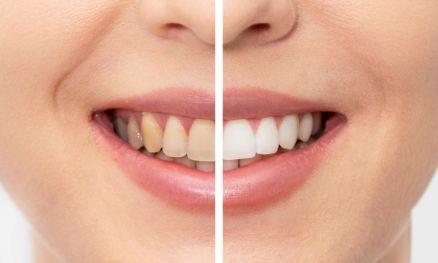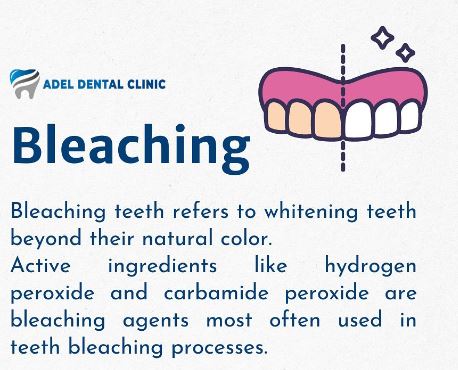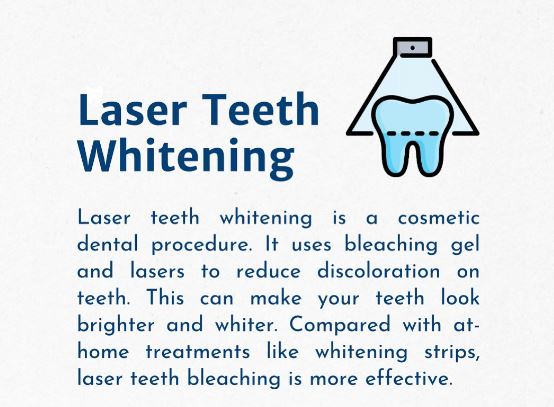Complete Guide to Teeth Whitening in Turkey
What is teeth whitening?
Teeth whitening is a cosmetic dental procedure that aims to lighten the color of the teeth and enhance their appearance. It involves the use of bleaching agents to remove stains and discoloration from the tooth surface, resulting in a brighter and more attractive smile.

The procedure can be performed in two main ways: in-office whitening and at-home whitening. In-office whitening is typically carried out by a dental professional. The dentist applies a high-concentration bleaching gel or solution directly to the teeth. Special tools and techniques, such as light-activated systems or laser technology, may be used to enhance the effectiveness of the whitening agent. In-office whitening generally provides fast and noticeable results, often lightening the teeth several shades in a single session. At-home whitening involves the use of whitening products that can be used conveniently at home. These products may include whitening gels, strips, trays, or toothpaste. The bleaching agents used in at-home kits are usually less concentrated than those used in professional settings. At-home whitening treatments usually require consistent and regular application over a period of days or weeks to achieve the desired level of whitening. Teeth whitening works by targeting two types of tooth discoloration: extrinsic and intrinsic stains. Extrinsic stains are superficial stains that occur on the outer surface of the teeth and are often caused by factors like food, beverages, tobacco, or inadequate oral hygiene. Intrinsic stains, on the other hand, originate from within the tooth structure and can be caused by aging, trauma, certain medications, or excessive fluoride exposure.

While teeth whitening can effectively remove stains and lighten the teeth, it's important to note that the results may vary depending on individual factors such as the severity of the discoloration and the type of stains present. Yellow-toned stains typically respond better to whitening treatments than brown or gray-toned stains. Teeth whitening is generally considered safe when performed by dental professionals or when using reputable at-home whitening products as directed. However, some individuals may experience temporary tooth sensitivity or gum irritation during or after the treatment. These side effects are usually mild and transient, resolving on their own. The duration of teeth whitening results varies from person to person. Factors such as individual habits (e.g., diet, oral hygiene, tobacco use) and the type of whitening treatment used can affect the longevity of the results. Generally, teeth whitening effects can last several months to a few years. Regular touch-ups or maintenance treatments may be needed to sustain the desired level of whiteness. It's important to consult with a dentist before undergoing any teeth whitening treatment. A dental professional can assess your oral health, evaluate your specific needs, and provide personalized recommendations for the most suitable whitening options for you.

Who is suitable candidate for teeth whitening?
Although most people are eligible for teeth whitening, there are a few situations in which you may not be. It's important to consult a dentist before starting any teeth-whitening technique to determine if it's the right choice for you. Teeth whitening is usually appropriate for people with healthy gums and adequate oral hygiene. However, before undergoing any whitening operations, you must treat any dental conditions like gum disease, tooth decay, or other oral issues. It's also important to remember that those under the age of sixteen, pregnant women, nursing mothers, and anyone with specific medical conditions may not be able to get their teeth whitened safely. Furthermore, restorations like veneers, crowns, or fillings won't lighten with your teeth, so you may need to consider other ways to get them to resemble your natural teeth after the whitening. Your dentist may evaluate your dental health and discuss your teeth-whitening options based on your unique needs and situation.
Please click here to get more info!
What are advantages and disadvantages of teeth whitening?
Advantages
- Because a whiter smile is frequently connected to youth and beauty, getting your teeth whitened can boost your self-esteem and confidence.
- Teeth whitening is non-invasive. Neither surgery nor dental restoration are necessary. Most of the time, anaesthesia is not required for treatment.
Disadvantages
- Whitening your teeth is not a long-term solution. The effects are transient, and over time, the whiteness may progressively disappear as a result of lifestyle choices, food, and dental cleanliness.
- The primary focus of teeth whitening procedures is on external stains on the tooth's surface. They might not be very effective on some types of discolouration or intrinsic stains that come from inside the tooth structure.
Please click here to get more info!
How is teeth whitening treatment performed?
Teeth whitening procedures are cosmetic dental treatments aimed at lightening the color of teeth and improving their appearance. These procedures involve the use of bleaching agents to remove stains and discoloration from the tooth surface, resulting in a brighter smile.
There are two main types of teeth whitening procedures: in-office whitening and at-home whitening.
a)In-Office Whitening: In-office teeth whitening is performed by a dental professional in a dental clinic. The procedure typically involves the following steps:
- The dentist evaluates the patient's oral health and discusses their expectations.
- The gums and soft tissues are protected using a protective gel or rubber shield.
- A high-concentration bleaching gel, usually containing hydrogen peroxide, is applied to the teeth.
- The gel may be activated using a specialized light source or laser.
- The whitening process is monitored, and the gel may be reapplied in multiple sessions until the desired level of whiteness is achieved.
- The dentist provides post-treatment instructions for maintaining the results.
Laser teeth whitening is a cosmetic dental procedure. It uses bleaching gel and lasers to reduce discoloration on teeth. This can make your teeth look brighter and whiter. Compared with at-home treatments like whitening strips, laser teeth bleaching more attractive.
b)At-Home Whitening: At-home teeth whitening allows individuals to whiten their teeth in the comfort of their own homes. This method typically involves the following steps:
- A dental professional evaluates the patient's oral health and takes impressions of their teeth.
- Custom-fit trays are created based on these impressions.
- The patient is provided with a lower-concentration whitening gel and instructions on how to use it.
- The gel is placed in the trays, which are worn for a specified duration, usually a few hours per day or overnight.
- The patient periodically visits the dental office for progress checks and adjustments if needed.
- Once the desired level of whitening is achieved, the patient may need occasional touch-up treatments to maintain the brightness
Combined teeth whitening refers to a comprehensive approach that combines both in-office and at-home teeth whitening procedures to achieve optimal results. This method utilizes the benefits of both techniques to provide a more effective and customized whitening experience.
The process typically begins with an in-office teeth whitening session performed by a dental professional. During this session, a high-concentration bleaching gel, usually containing hydrogen peroxide, is applied to the teeth. The gel may be activated using a specialized light source or laser to accelerate the whitening process. Multiple in-office sessions may be scheduled, with each session typically being about a week apart.
In addition to the in-office sessions, the patient is provided with a custom at-home whitening kit. This kit includes custom-fit trays and a lower-concentration whitening gel. The patient wears the trays filled with the gel for a specified duration, usually a few hours per day or overnight, as guided by the dentist. The at-home phase of the treatment continues for several weeks, with periodic check-ups to monitor progress and make any necessary adjustments. Combined teeth whitening offers several advantages. The in-office sessions provide immediate and noticeable results, while the at-home component allows for ongoing treatment and maintenance. This approach allows for a more personalized and long-lasting whitening outcome.

It's important to note that teeth whitening procedures are most effective for removing extrinsic stains caused by external factors such as food, beverages, or tobacco. They may have limited effectiveness on intrinsic stains or certain types of discoloration. Additionally, teeth whitening is not a permanent solution, and results can fade over time due to factors like diet and oral hygiene habits. It's recommended to consult with a dental professional to determine the most suitable teeth whitening option based on individual needs, oral health, and desired outcomes.
FREQUENTLY ASKED QUESTIONS
How much does teeth whitening cost? Is teeth whitening in Turkey cheaper?
The cost of teeth whitening can vary depending on various factors, including the location, the dental clinic, the type of whitening procedure, and any additional services included. While I can provide you with general information, please note that prices can vary significantly depending on your location and specific circumstances.
In general, the cost of teeth whitening can range from around $200 to $1,000.
Please click here to get more info!
Does teeth whitening hurt? Which anesthesia is used for teeth whitening?
Teeth whitening procedures are generally considered safe and relatively painless. However, some individuals may experience mild sensitivity or discomfort during or after the treatment. Let's explore the potential discomfort associated with teeth whitening and the use of anesthesia in such procedures.
- Sensitivity during Treatment: During an in-office teeth whitening procedure, some people may experience temporary sensitivity or discomfort. This sensitivity is usually mild and transient, affecting the teeth and possibly the gums. It is more common in individuals with pre-existing tooth sensitivity. However, the majority of individuals tolerate the procedure well without significant discomfort.
- Post-Treatment Sensitivity: After teeth whitening, some individuals may experience temporary tooth sensitivity, especially to hot or cold stimuli. This sensitivity typically subsides within a few days to a week after the procedure. Using desensitizing toothpaste or gel, as recommended by your dentist, can help alleviate any discomfort.
- Anesthesia for Teeth Whitening: Local anesthesia is generally not required for routine teeth whitening procedures as they are non-invasive and do not involve significant discomfort. The bleaching agents used in teeth whitening penetrate the enamel without the need for anesthesia.
It's worth noting that if you have dental restorations, such as fillings or crowns, the whitening agents will not change their color. This can result in uneven whitening and potentially require replacement of these restorations to match the new shade of your natural teeth. If you have concerns about discomfort during teeth whitening, it's best to discuss them with your dental professional. They can provide guidance, recommend strategies to minimize sensitivity, and tailor the treatment to your specific needs. Remember to follow the instructions provided by your dentist or the teeth whitening product manufacturer to ensure safe and effective use.
How long does teeth whitening last?
Several variables, including the person's oral hygiene practices, food preferences, lifestyle considerations, and the precise whitening procedure performed, might affect how long teeth whitening results last. Even though it is challenging to give an exact timeline because it might differ from person to person, I can give you an idea of how long teeth whitening results may last in general:
- In-Office Teeth Whitening:
Teeth whitening procedures carried out in-office often yield quick, observable results. Depending on the patient, the results of a single in-office session may last a few months to a year or longer. However, it's crucial to keep in mind that the effects will progressively disappear over time due to elements including nutrition, oral hygiene routines, and lifestyle decisions.
- At-Home Teeth Whitening Kits:
Kits for at-home teeth whitening: When used according to instructions, kits for at-home teeth whitening can also deliver successful and long-lasting results. Although the benefits of whitening might last anywhere from a few months to a year or longer, this is usually how long they last. To keep the appropriate level of whiteness, periodic touch-up procedures could be required.
It's critical to realize that teeth whitening is not a permanent fix and that each person may experience the results differently. Several factors affect how long tooth whitening results last, including:
- Oral care habits, including as consistent brushing, flossing, and rinsing, can help keep your teeth looking whiter for a longer period of time. Plaque and surface stains might build up as a result of poor dental hygiene, which can reduce the whitening benefits.
- Dietary Decisions: The teeth can become stained by a number of foods and drinks, including coffee, tea, red wine, berries, and foods with a lot of colour. You may keep your teeth's whiteness by limiting the amount of these stains you consume or by rinsing your mouth with water afterward.
- Lifestyle Factors: Lifestyle decisions like using tobacco or smoking can dramatically discolor and stain teeth. By avoiding these behaviors, you can keep your whiter teeth looking bright.
- Aging and Natural Yellowing: As the enamel deteriorates and the underlying dentin shows through, teeth inevitably start to turn a little yellow over time. Although teeth whitening procedures can help reverse this natural yellowing, as you age, your teeth's whiteness may gradually deteriorate.
- Treatments for upkeep and touch-ups: The results of teeth whitening can be extended by using at-home maintenance kits or routine touch-up procedures, as advised by your dentist. To restore your teeth's original whiteness, these procedures typically entail shorter application times or less potent whitening ingredients.
It's crucial to speak with your dentist about the best teeth-whitening solutions for your unique needs and to learn more about how long the results might last given your individual situation.
Is teeth whitening safe in Turkey? Are Turkish dentist experienced for teeth whitening?
A large number of Turkish dentists have experience with teeth whitening procedures. Turkey is renowned for having trustworthy dentists who receive in-depth instruction and training. Turkey has a large number of dentists who have graduated from reputable dental universities and schools, both domestically and abroad.
Turkish dentists frequently take part in continuing education programs in addition to their formal schooling to stay current with the most recent developments in dental procedures and technology, such as teeth whitening. They can deliver treatments that are both efficient and secure thanks to their access to professional-grade whitening supplies and tools.
Additionally, Turkish dental clinics routinely treat foreign patients looking for teeth whitening treatments due to the country's growing reputation as a destination for dental tourism. Turkish dentists have excellent knowledge in offering teeth whitening treatments to people from various backgrounds as a result of being exposed to a varied variety of patients and their unique needs.
Researching a dentist's credentials, expertise, and patient testimonials is advised before selecting one for teeth whitening in Turkey. Find dentists who are experts in teeth whitening techniques or who have a focus on aesthetic dentistry. By doing so, you can make sure that you choose a dentist with experience who can provide the desired outcomes efficiently and safely.
Overall, even though it's crucial to conduct your research and choose a trustworthy dentist, many Turkish doctors have the necessary training and experience to offer high-quality teeth whitening procedures.
Are whitening strips bad for your teeth?
Using whitening strips properly and as directed is typically considered to be safe for your teeth. It is essential to know the potential risks and limitations of using whitening strips, though. Here are a few considerations:
- Whitening strips include bleaching ingredients that can pierce tooth enamel to remove stains, such as hydrogen peroxide or carbamide peroxide. Particularly if you have sensitive teeth or gums, this procedure occasionally results in transient tooth sensitivity.
- Gum Irritation: The whitening strips may temporarily irritate the gums if they come into contact with them directly.
- Uneven Whitening: Since whitening strips are made to stick to the teeth's front surfaces, this might cause uneven whitening.
- Limited Effectiveness on Deep Stains: Whitening strips often work well to lighten mild to moderate tooth discoloration brought on by substances like coffee, tea, or cigarettes. The deeper stains or discoloration brought on by some drugs or oral diseases, however, could not be as easily removed by these methods.
- Inappropriate and Excessive Use: Using whitening strips more frequently or for longer periods of time than advised can raise the risk of tooth sensitivity, gum sensitivity, and possible enamel damage.
Please click here to get more info!
Do teeth whitening strips work?
Strips for teeth whitening can be useful, particularly for mild to severe tooth discoloration brought on by substances like coffee, tea, or tobacco. Bleaching chemicals, including hydrogen peroxide or carbamide peroxide, are frequently found in whitening strips, which help eliminate surface stains and lighten the color of the teeth.
Whitening strips can yield obvious benefits when used as instructed and consistently over a predetermined length of time. With consistent usage of whitening strips, many consumers report a gradual increase in the brightness and whiteness of their teeth.
It's crucial to remember that the efficacy of whitening strips might vary based on a number of variables, including the degree and kind of tooth discoloration, product quality, and individual factors including tooth structure and natural tooth color. While some people can experience more pronounced results, others might go through more subtle adjustments.
It's also important to note that whitening strips may not be as efficient in removing deeper stains or discolouration brought on by some medications or dental disorders as they are primarily made to address surface stains. In these circumstances, dental professionals may use professional teeth whitening procedures to get more satisfying and striking effects.
The prescribed time and frequency of usage, as well as other recommendations included with the product, must all be followed in order to get the optimum results from whitening strips. Inappropriate or excessive use of whitening strips may result in tooth sensitivity, gum discomfort, or enamel damage.
It is recommended to speak with your dentist before using any whitening strips. They may evaluate your oral health, identify the root of tooth discoloration, and advise you on whether whitening strips are the best option for your particular requirements. To achieve the best results, your dentist may also suggest further teeth-whitening solutions or a combination of procedures.
Does insurance cover teeth whitening?
Teeth whitening is a cosmetic operation that is often not covered by dental insurance because it is regarded as an optional and non-essential therapy. Dental insurance typically focuses on providing coverage for important procedures like preventive care, fillings, extractions, and necessary restorative procedures that are meant to maintain oral health.
It's crucial to remember that insurance coverage can change based on the particular insurance plan and provider. If teeth whitening is deemed medically required owing to significant intrinsic discolouration brought on by specific drugs or dental diseases, some dental insurance policies may offer limited reimbursement. In these situations, your dentist would have to offer thorough rationale and data to back up the medical necessity of the teeth-whitening procedure.
To learn the specifics of your coverage for teeth whitening, it is advised to consult your dental insurance policy or speak with your insurance provider. They can give you specific details regarding the treatments that are covered, any restrictions or exclusions, and whether or not teeth whitening is covered by your plan.
If your dental insurance does not cover teeth whitening, you might look into other ways to lower the cost. Numerous dental offices provide financing options or package deals for teeth-whitening procedures. Additionally, there are a variety of over-the-counter teeth-whitening products with varying price ranges, albeit their efficacy may differ from that of professional procedures.
Never forget to talk to your dentist before starting any teeth-whitening procedures to find the best solution for your unique requirements.
How long after teeth whitening can I eat normally?
After teeth whitening, it's generally recommended to wait for at least one to two hours before eating or drinking anything. This allows the whitening agents to settle on the teeth and reduces the risk of them being immediately washed away or diluted by consuming food or beverages. Additionally, it's advisable to avoid consuming foods and drinks that are known to cause staining or discoloration for at least 24 to 48 hours after teeth whitening. This includes items such as coffee, tea, red wine, dark-colored sodas, berries, and highly pigmented foods like tomato sauce or soy sauce. By avoiding these staining substances, you can help prolong the results of your teeth whitening treatment. During the initial 24 to 48 hours after teeth whitening, it's best to stick to a white diet, which consists of non-staining foods like plain chicken, fish, white rice, plain pasta, and white bread. Drinking water is generally safe after teeth whitening, but it's recommended to avoid using a straw to minimize contact with the front teeth.
It's important to follow any specific instructions provided by your dentist regarding eating and drinking after teeth whitening. They may provide personalized recommendations based on the specific whitening treatment used and your individual circumstances. Remember, maintaining good oral hygiene practices, including regular brushing, flossing, and dental check-ups, along with healthy eating habits, can help prolong the results of your teeth whitening and keep your smile looking bright.
